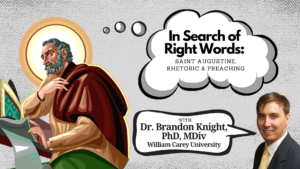 Column Title: In Search of Right Words: Saint Augustine, Rhetoric, and Preaching
Column Title: In Search of Right Words: Saint Augustine, Rhetoric, and Preaching
By Brandon Knight, Ph.D.
William Carey University
July-August column entry: “The Aim of Scripture”
Column Description here: Saint Augustine, Bishop of Hippo, in his work On Christian Doctrine, illustrates the important relationship between preaching and rhetoric. Even in his day, many questioned what use the church could possibly gain from the study of oratory. Nevertheless, Augustine saw something much deeper in communication that many Christians still miss centuries later. This column will be a personal journey through Augustine’s On Christian Doctrine, through which he shows how God can, in fact, use rhetoric to help us see more clearly the beauty of scripture as well as find the right words when articulating gospel truths to others.
July-August 2022 / June 2022 / April-May 2022 / February 2022 / January 2022 / December 2021
The Aim of Scripture
What is the purpose of Scripture in the life of the believer?
Many, like myself, will respond that Scripture exists to reveal truths about God and the history of redemption. But isn’t the goal of Scripture more than knowledge? Our hyper focus on knowledge as the end of the Christian life has led to many barriers for Christian teachers.
When rereading some passages of St. Augustine’s On Christian Doctrine, I was reminded of a peculiar section in which Augustine informs readers that Scripture is possibly no longer needed after maturity is reached, except for when teaching. The caveat, however, is this: it is only when the believer is truly resting upon faith, hope, and love that he is no longer in need of the text itself.
It would be wrong to think that Augustine was arguing that at a certain point of Christian maturity, the Scriptures can be cast aside in totality. Augustine is reframing the topic to illustrate the most important aspect of the Christian teacher’s relationship to Scripture, namely, its effect and production of maturity.
Augustine reveals that to teach Scripture properly, one must have more than mere knowledge of Scripture. Scripture must lead to maturity in the life of the Christian before she can teach it to others properly.
Here we see knowledge as a bedrock from which maturity can occur. Maturity is the result because it manifests in faith, hope, and love.
Knowledge as an end is merely a source of pride (1 Cor. 8:1). Surely, God did not give the Bible so Christians could be smarter. No. The end of knowledge, especially knowledge of God, is partnering the knowledge of God with love.
Augustine points to 1 Timothy 1:5 as a verse for Christian teachers because it describes the call to teach. “The aim of our charge is love that issues from a pure heart and a good conscience and a sincere faith” (ESV) (emphasis mine). Notice how faith, hope, and love all surface in Paul’s wisdom to Timothy about the Christian teacher’s calling.
Maturity is the proper effect of God’s word in one’s heart through the work of the Holy Spirit. Such growth manifests itself in, Augustine argues, the embodiment of these three virtues.
The Apostle Paul chastised the Corinthians believers for relying on knowledge without love. He then eloquently illustrated how all acts regardless of one’s knowledge, passion, or courage are insufficient without one divine ingredient: “If I give away all I have, and if I deliver up my body to be burned, but have not love, I gain nothing” (1 Cor. 13: 3, ESV).
Even martyrdom means nothing without love!
So, how are we to square Augustine’s comment of setting aside Scripture once maturity is reached?
No one can deny the authority of Scripture in the life of Augustine. His words, especially in the Confessions, drip with Scripture. On Christian Doctrine is literally a training manual for others to interpret and articulate properly the ideas of Christian orthodoxy from the Bible.
My favorite passages from Augustine are when his words are so intertwined with scriptural references that they become inseparable. What a model for us to follow!
Augustine knew and loved the Scriptures because they revealed the God who knew him and yet still loved him.
Scripture as an Engine for Virtuous Living
I find Calvin Troup’s analogy of Augustine’s use of Scripture as an “engine” that fuels these three virtues in the life of the Christian to be quite powerful.[1] Seeing Scripture from this angle allows us to centralize its effect in our lives.
Scripture is active; not passive. The fruit of our learning should be evident and ongoing even when we are not sitting and reading. The narratives, commands, wisdom, and revelation should all formulate the believer’s identity as manifested his words and actions. To simply garner information with no result reveals a lack of authority in our understanding of Scripture. This possibly points to the lack of leadership in the church today.
Consider as Augustine does how many believers—Old and New Testament—lived without owning a personal copy of Scripture. Augustine questions their lives noting that many of them are known even to this day as being bulwarks of the Christian faith. How? His question doesn’t derogate Scripture, rather it points us to the evident effect Scripture had on their lives.
Most believers in history have cherished the Scriptures even though they would only hear them read during times of worship. This sparsity, which we moderns see as a detriment, was historically a challenge to commit Scripture to heart and mind. Thus, it became a part of their identity. No Bible App was available nor needed. It was hidden in their heart.
This intentional reliance upon Scripture, despite sparsity, manifested itself fully in faith, hope, and love in their lives.
What is your aim when reading Scripture? Merely knowledge? Or love? The answer will say much about your teaching.
Notes
[1] Calvin L. Troup, “Temporality, Eternity, and Wisdom: The Rhetoric of Augustine’s Confessions,” 1999, 134.
